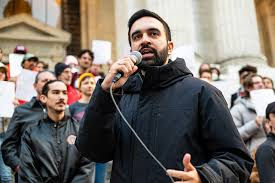Zohran Mamdani’s Rise: Echoes of Hitler’s Path to Power
- Bruce News MA Ed.
- Jun 26, 2025
- 2 min read

Bruce News MA Ed.
CEO / Writer
Zohran Mamdani, a 33-year-old state assemblyman and democratic socialist, is on the cusp of becoming New York City’s first Muslim mayor after a stunning Democratic primary victory. Polling second behind Andrew Cuomo before clinching the nomination, Mamdani’s campaign has electrified progressives with promises of free buses, universal childcare, rent freezes, and city-run grocery stores. Yet, his meteoric rise draws unsettling comparisons to Adolf Hitler’s path to becoming German chancellor in 1933—in his ideology and in his seductiveness, his encompassing promises and divisive rhetoric has polarized New York, home to the world’s largest Jewish population outside Israel.
Like Hitler, who exploited Germany’s economic woes and social unrest with grandiose pledges of prosperity and national revival, Mamdani has tapped into New Yorkers’ frustrations over unaffordable housing and stagnant wages. His platform, while progressive, mirrors Hitler’s tactic of promising everything to everyone—vague, sweeping solutions that critics, including The New York Times, call fiscally reckless and impractical for a city with a $115 billion budget. Both men cultivated fervent followings through charisma and media savvy, with Mamdani leveraging X and grassroots momentum to rally young voters, much as Hitler used radio and rallies to galvanize discontented Germans.
Mamdani’s controversies over Jewish issues intensify these parallels. On June 24, 2025, during an interview on “The Bulwark” podcast, he defended the phrase “Globalize the Intifada,” likening it to the Warsaw Ghetto Uprising—a Jewish revolt against Nazi persecution. The U.S. Holocaust Memorial Museum swiftly condemned the comparison, noting that “Intifada,” tied to the Second Intifada’s wave of Palestinian suicide bombings that killed hundreds of Israelis, evokes violence, not resistance. The phrase, a staple of anti-Israel protests calling for Israel’s destruction, has alarmed New York’s Jewish community, already anxious over Mamdani’s support for the Boycott, Divestment, and Sanctions (BDS) movement and his refusal to co-sponsor Holocaust Remembrance Day resolutions.
Posts on X capture the fear among Jewish New Yorkers, with some calling Mamdani’s rhetoric a “dog whistle” for antisemitism, accusing him of sanitizing calls for violence. His primary win has sparked division, testing whether New York remains a safe haven for its historic Jewish and Israeli diaspora or is tilting toward hostility. Critics argue that, like Hitler, who scapegoated Jews to consolidate power, Mamdani risks inflaming tensions in a city where Jewish identity has long intertwined with its Democratic, cosmopolitan ethos—once proudly “blue-and-white.”
Mamdani insists his policies benefit all, and supporters like Alexandria Ocasio-Cortez hail his vision for equity. Yet, the parallels to Hitler’s rise persist in method: promising a utopian future to a frustrated electorate while navigating divisive issues in ways that alienate a vulnerable minority. As New York awaits the general election, Mamdani’s ascent raises a critical question: will his bold promises unite the city, or do they echo a historical playbook that thrives on division and overreach?
The New York City Mayoral Election (11/4/2025) is similar to the situation of the 11/5/2024 Presidential Election. The choice is clear, we are choosing between Good and Evil. Where do you stand ?
Pray, Vote and be Active --- Bruce








Comments